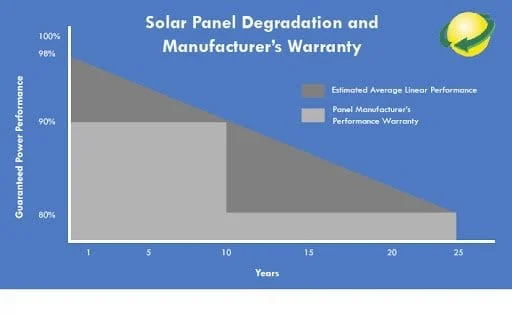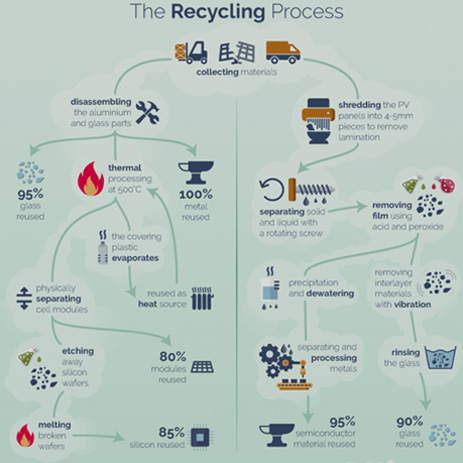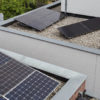In our last article, we covered what your options are when your solar panels enter their sunset years. For the most part, you can extend the life of your solar panels for many more years after their manufacturer-stipulated lifespan comes to an end.
However, let’s say that push comes to shove and you do have to replace your panels. Have you ever wondered where your panels might end up? Is there a panel graveyard that they will be condemned to, or are they recycled?
Questions such as these also engender notions of how green solar panels really are. If all solar panels are headed to a landfill, then aren’t we replacing one problem with another? The truth isn’t so straightforward though.
The Lifespan of a Solar Panel
Most solar panels out there are rated to offer up to 80% of their original output till 25 or 30 years. The manufacturer may offer replacement warranties if your panel fails to live up to this claim.
The 25 year limit is by no means the “lifespan” of the panel itself. You can go on using the panels for far longer if you wish to. Since most solar panels degrade around 0.5% annually, at 25 years you will still be left with 87.5% usability.

Quality modern panels degrade at an even lesser rate giving them an even longer usable life, however, only the user can ultimately determine how long the solar panels can remain useful.
If you think that the panels are well worth it even at 70% of their original output, then their lifespan can be around 50 years or more. We’ve covered this in greater detail in our article on what to do with your panels once they expire.
Another point to note is that the above figures are based on the manufacturer’s guaranteed performance rates. The actual performance drop rate is usually only around 6%-8%.
What Happens to Solar Panels After they are Discarded
Let’s say it is time for you to drop the panels and get a new set. What will happen with them? Since Australia has one of the highest adoption rates of solar energy, there are a lot of solar panels in the pipeline waiting to be disposed of.
Currently, significant numbers of solar panels go to landfill, where they may be disassembled into their components which are glass, aluminum, plastic, silicon, and other metals. If the current pace of solar adoption continues, then there could be up to 100,000 tons of solar modules in landfills. That’s not good for the enviroment.

Unfortunately, recycling solar panels is an issue because recyclers require significant component volumes to break even. Even though solar panels can be recycled to a degree, the cost to process the waste is higher than what most recyclers can stomach, the current volume of solar panel output is not capable of supporting a profitable outcome.
While the situation should resolve automatically when the solar waste hits a particular point, there are legislative measures in the works that may solve the issue early. The government has been considering adding solar panels to the Product Stewardship Act, which dictates how electronic items are to be discarded off.
If added, the law will require product manufacturers, suppliers, installers, to act responsibly and take ownership of waste management of the parts they are responsible for. But just how enforceable will this be.
This model is already in effect in Europe to good effect and can be implemented in Australia, too particularly in government acts. Even if it doesn’t, solar waste recycling will reach a natural tipping point at some point in the near future. Since most materials used in a solar panel and associated systems are recyclable, they can continue to add value to other products.
Conclusion
Looking for the best deals on solar power systems? We at bidmysolar™ ensure that all our installers and partners adhere to strict quality compliance standards. We are constantly updating our best practices to ensure that all our installations are as environmentally friendly as possible.
Feel free to check out how we work or contact us for a quick chat.





